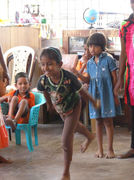Tackling poverty locally

Asha Trust works in a community on the outskirts of Colombo in Sri Lanka. Housing and other facilities are poor here and finding work is a daily struggle: many earn less than $2 a day. Our community workers support people to develop solutions to the many challenges they face, restoring hope and building ladders out of poverty.
We run a range of services and activities from a purpose-built centre in the heart of the community. These include booster classes for the local children and young people, activities such as art therapy and mindfulness, plus a lot of fun with dance and music sessions and regular trips out. We also run activities for the mothers such as sewing and cooking.
The Asha Centre is an oasis in a tough place providing a safe space for children to learn and grow.


Supporting children with disabilities
We ensure that our regular services are welcoming and accessible to all, whilst also running dedicated services for children and young people with disabilities, including weekly sessions working closely with our partner RCCI. We also provide advocacy to help families access medical and statutory services.
Education • Employment • Environment
WE aim to provide a holistic programme of activities, focusing on three key themes of Education, Employment and Environment.
We’re building a space where children and communities thrive—academically, socially, and emotionally. Our goals include:
Education: WE provide booster classes in a range of subjects including Sinhala, Tamil, and English, and improve numeracy through the . Tracking progress through monthly assessments. Plus introducing Social and Emotional Learning (SEL) activities to help students connect and grow, fostering a positive culture and behaviour across the centre.
Employment: WE have created a number of employment opportunities for local community members. Providing essential skills which can be taken into the workplace elsewhere. In addition we have business leaders meet our young people, providing inspiration through they personal stories
Environment: We provide a meal for anyone that wants it at each session, we know that a hungry child can't learn. Providing a cup of milk and a simple meal inproves learing and behaviour, assisting with focus and growth. We also aim to promote joyful living through celebrations and expressive arts. Encourage reading, and build a culture of responsibility.












